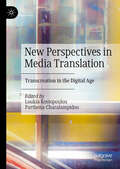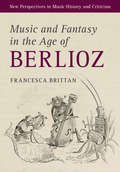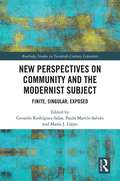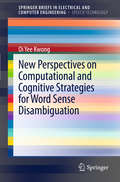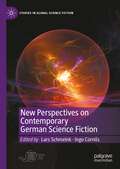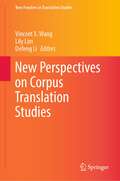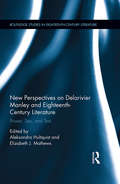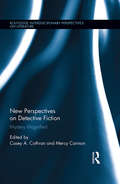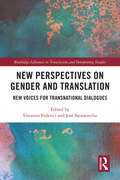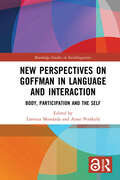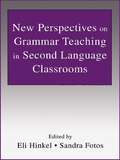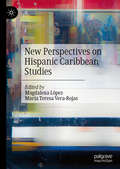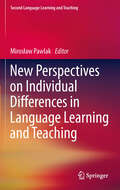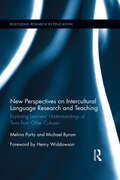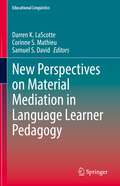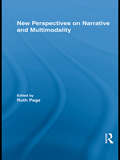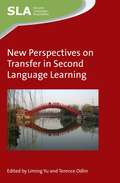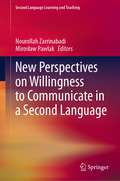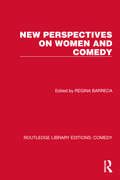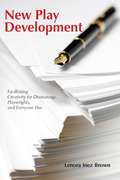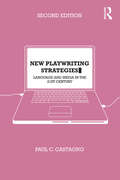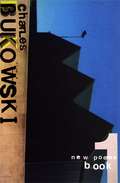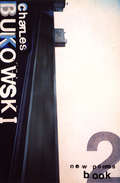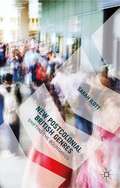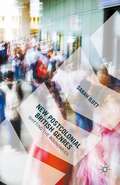- Table View
- List View
New Perspectives in Media Translation: Transcreation in the Digital Age
by Loukia Kostopoulou Parthena CharalampidouThis edited book explores the practice of transcreation in a variety of contexts, from audiovisual material to digital and marketing material. Drawing on the latest developments in translation and media studies, the volume promotes an understanding of the transcreation process and the way it challenges the concept of translation (Chaume 2018) and impacts on training for translators, localizers and content creators. Chapters include both theoretical and experimental research contributions that investigate facets of transcreation in diverse media and genres and offer constructive insights in the discipline. This book covers the theoretical aspects and practices of transcreation in audiovisual and digital media and will appeal to scholars, researchers and professionals working in the fields of translation, especially audiovisual translation, transcreation, localization and new media.
New Perspectives in Music History and Criticism: Music and Fantasy in the Age of Berlioz (New Perspectives in Music History and Criticism #27)
by Francesca BrittanThe centrality of fantasy to French literary culture has long been accepted by critics, but the sonorous dimensions of the mode and its wider implications for musical production have gone largely unexplored. In this book, Francesca Brittan invites us to listen to fantasy, attending both to literary descriptions of sound in otherworldly narratives, and to the wave of 'fantastique' musical works published in France through the middle decades of the nineteenth century, including Berlioz's 1830 Symphonie fantastique, and pieces by Liszt, Adam, Meyerbeer, and others. Following the musico-literary aesthetics of E. T. A. Hoffmann, they allowed waking and dreaming, reality and unreality to converge, yoking fairy sound to insect song, demonic noise to colonial 'babbling', and divine music to the strains of water and wind. Fantastic soundworlds disrupted France's native tradition of marvellous illusion, replacing it with a magical materialism inextricable from republican activism, theological heterodoxy, and the advent of 'radical' romanticism.
New Perspectives on Community and the Modernist Subject: Finite, Singular, Exposed (Routledge Studies in Twentieth-Century Literature)
by Paula Martín Salván María J. López Gerardo Rodriguez SalasNew Perspectives on Community and the Modernist Subject: Finite, Singular, Exposed offers new approaches to the modernist subject and its relation to community. With a non-exclusive focus on narrative, the essays included provide innovative and theoretically informed readings of canonical modernist authors, including: James, Conrad, Joyce, Woolf, Lawrence, Mansfield, Stein, Barnes and Faulkner (instead of Eliot), as well as of non-canonical and late modernists Stapledon, Rhys, Beckett, Isherwood, and Baldwin (instead of Marsden). This volume examines the context of new dialectico-metaphysical approaches to subjectivity and individuality and of recent philosophical debate on community encouraged by critics such as Alain Badiou, Jean-Luc Nancy, Maurice Blanchot, Giorgio Agamben, Roberto Esposito and Jacques Derrida, among others, of which a fresh re-definition of the modernist subject and community remains to be made, one that is likely to enrich the field of "new Modernist studies". This volume will fill this gap, presenting a re-definition of the subject by complementing community-oriented approaches to modernist fiction through a dialectical counterweight that underlines a conception of the modernist subject as finite, singular and exposed, and its relation to inorganic and inoperative communities.
New Perspectives on Computational and Cognitive Strategies for Word Sense Disambiguation
by Oi Yee KwongCognitive and Computational Strategies for Word Sense Disambiguation examines cognitive strategies by humans and computational strategies by machines, for WSD in parallel. Focusing on a psychologically valid property of words and senses, author Oi Yee Kwong discusses their concreteness or abstractness and draws on psycholinguistic data to examine the extent to which existing lexical resources resemble the mental lexicon as far as the concreteness distinction is concerned. The text also investigates the contribution of different knowledge sources to WSD in relation to this very intrinsic nature of words and senses.
New Perspectives on Contemporary German Science Fiction (Studies in Global Science Fiction)
by Lars Schmeink Ingo CornilsNew Perspectives on Contemporary German Science Fiction demonstrates the variety and scope of German science fiction (SF) production in literature, television, and cinema. The volume argues that speculative fictions and explorations of the fantastic provide a critical lens for studying the possibilities and limitations of paradigm shifts in society. Lars Schmeink and Ingo Cornils bring together essays that study the renaissance of German SF in the twenty-first century. The volume makes clear that German SF is both global and local—the genre is in balance between internationally dominant forms and adapting them to Germany’s reality as it relates to migration, the environment, and human rights. The essays explore a range of media (literature, cinema, television) and relevant political, philosophical, and cultural discourses.
New Perspectives on Corpus Translation Studies (New Frontiers in Translation Studies)
by Defeng Li Lily Lim Vincent X. WangThe book features recent attempts to construct corpora for specific purposes – e.g. multifactorial Dutch (parallel), Geasy Easy Language Corpus (intralingual), HK LegCo interpreting corpus – and showcases sophisticated and innovative corpus analysis methods. It proposes new approaches to address classical themes – i.e. translation pedagogy, translation norms and equivalence, principles of translation – and brings interdisciplinary perspectives – e.g. contrastive linguistics, cognition and metaphor studies – to cast new light. It is a timely reference for the researchers as well as postgraduate students who are interested in the applications of corpus technology to solving translation and interpreting problems.
New Perspectives on Delarivier Manley and Eighteenth Century Literature: Power, Sex, and Text (Routledge Studies in Eighteenth-Century Literature)
by Aleksondra Hultquist Elizabeth J. MathewsThis first critical collection on Delarivier Manley revisits the most heated discussions, adds new perspectives in light of growing awareness of Manley’s multifaceted contributions to eighteenth-century literature, and demonstrates the wide range of thinking about her literary production and significance. While contributors reconsider some well-known texts through her generic intertextuality or unresolved political moments, the volume focuses more on those works that have had less attention: dramas, correspondence, journalistic endeavors, and late prose fiction. The methodological approaches incorporate traditional investigations of Manley, such as historical research, gender theory, and comparative close readings, as well as some recently influential theories, like geocriticism and affect studies. This book forges new paths in the many underdeveloped directions in Manley scholarship, including her work’s exploration of foreign locales, the power dynamics between individuals and in relation to states, sexuality beyond heteronormativity, and the shifting operations and influences of genre. While it draws on previous writing about Manley’s engagement with Whig/Tory politics, gender, and queerness, it also argues for Manley’s contributions as a writer with wide-ranging knowledge of both the inner sanctums of London and the outer developing British Empire, an astute reader of politics, a sophisticated explorer of emotional and gender dynamics, and a flexible and clever stylist. In contrast to the many ways Manley has been too easily dismissed, this collection carefully considers many points of view, and opens the way for new analyses of Manley’s life, work, and vital contributions to the full range of forms in which she wrote.
New Perspectives on Detective Fiction: Mystery Magnified (Routledge Interdisciplinary Perspectives on Literature #55)
by Casey Cothran Mercy CannonThis collection establishes new perspectives on the idea of mystery, as it is enacted and encoded in the genre of detective fiction. Essays reclaim detective fiction as an object of critical inquiry, examining the ways it shapes issues of social destabilization, moral ambiguity, reader complicity, intertextuality, and metafiction. Breaking new ground by moving beyond the critical preoccupation with classification of historical types and generic determinants, contributors examine the effect of mystery on literary forms and on readers, who experience the provocative, complex process of coming to grips with the unknown and the unknowable. This volume opens up discussion on publically acclaimed, modern works of mystery and on classic pieces, addressing a variety of forms including novels, plays, graphic novels, television series, films, and ipad games. Re-examining the interpretive potential of a genre that seems easily defined yet has endless permutations, the book closely analyzes the cultural function of mystery, the way it intervenes in social and political problems, as well as the literary properties that give the genre its particular shape. The volume treats various texts as meaningful subjects for critical analysis and sheds new light on the interpretive potential for a genre that creates as much ambiguity as it does clarity. Scholars of mystery and detective fiction, crime fiction, genre studies, and cultural studies will find this volume invaluable.
New Perspectives on Gender and Translation: New Voices for Transnational Dialogues (Routledge Advances in Translation and Interpreting Studies)
by Eleonora Federici and José SantaemiliaThis collection expands the body of research on the intersection of gender and translation to highlight perspectives across different countries in Europe, showcasing developments in the field from its origins in the emergence of feminist translation in Quebec over the last thirty years. Building off seminal work on feminist translation by scholars in Canada in the 1980s and 1990s, the book explores the evolution of the discipline in shifting translation practices and research across a range of European countries, with a focus on underrepresented areas such as Malta, Serbia, and Poland. The different chapters examine key developments such as the critical reframing of gender and identity, the viewing of historical translation activity by women through the lens of ideological and political motivations, and the analysis of socio-political contexts where feminist or gender-inspired translation has impacted translators’ practices. The volume looks concurrently at the European context and beyond it, putting the spotlight on new voices in translation and gender research in the region but also encouraging transnational dialogues on key issues in the discipline, pushing the field further into new directions. This book will be of particular interest to scholars in translation studies, gender studies, and European literature.
New Perspectives on Goffman in Language and Interaction: Body, Participation and the Self (Routledge Studies in Sociolinguistics)
by Lorenza Mondada Anssi PeräkyläThis collection highlights new perspectives on the work of Erving Goffman, revisiting his place in contemporary social theory and interactional linguistics research and its impact in surfacing new insights in conversation analysis and our understanding of Goffman’s legacy. The volume outlines the theoretical foundations of Goffman’s research across linguistics and the social sciences. Bringing together a crossdisciplinary group of scholars, the book is organized around these themes, with sections on self and identity, participation, and bodily practices in social interaction. Each chapter comprises three perspectives— look back at Goffman’s original texts, their correlation in contemporary empirical research in conversation analysis, and a discussion of conceptual implications in relevant fields such as interactional sociolinguistics, linguistic anthropology, critical sociolinguistics, and related disciplines. Taken as a whole, the book not only offers a comprehensive critical overview of Goffman’s legacy in empirical work in conversation analysis and the social sciences but also the conceptual grounding for new studies to investigate his continuing role in contemporary scholarship. This innovative collection will be of interest to students and scholars in sociolinguistics, linguistic anthropology, and critical discourse analysis as well as sub-disciplines of sociology and psychology.
New Perspectives on Grammar Teaching in Second Language Classrooms
by Eli Hinkel Sandra FotosNew Perspectives on Grammar Teaching in Second Language Classrooms brings together various approaches to the contextualized teaching of grammar and communicative skills as integrated components of second language instruction. Its purpose is to show from both theoretical and practical perspectives that grammar teaching can be made productive and useful in ESL and EFL classrooms. In this text: *First-rate scholars approach the teaching of grammar from multiple complementary perspectives, providing an original, comprehensive treatment of the topic. *Discourse analysis and research data are used to address such pedagogical areas as grammatical and lexical development in speaking, listening, reading, and writing. *The communicative perspective on ESL and EFL instruction that is presented provides ways for learners to enhance their production skills, whereas the meaning-based grammar instruction can supplement and strengthen current methodology with a communicative focus. This volume is intended as a foundational text for second language grammar pedagogy courses at the advanced undergraduate and master's levels.
New Perspectives on Hispanic Caribbean Studies
by María Teresa Vera-Rojas Magdalena LópezWhat are the main contributions of Hispanic cultural products and practices today? This book is a collection of essays on new critical trends in Hispanic Caribbean thinking. It offers an update on the state of Hispanic Caribbean studies through the discussion of diverse theoretical perspectives around notions of affect, archipelagic thinking, deterritoriality, and queer experiences and subjectivities. These eccentric Caribbean and aquatic imaginaries move beyond those that are circumscribed by identity, nation, insularity, and the colonial epistemologies derived from these conceptions. Due to its cultural and historical specificities, the Hispanic Caribbean constitutes a focus of study crucial to re-thinking global dynamics today.
New Perspectives on Individual Differences in Language Learning and Teaching
by Mirosław PawlakThe volume constitutes an attempt to capture the intricate relationship between individual learner differences and other variables which are of interest to theorists, researchers and practitioners representing such diverse branches of applied linguistics as psycholinguistics, sociolinguistics, pragmatics or language teaching methodology. It brings together contributions by Polish and international authors, including leading experts in the field, touching upon changing perspectives on individual variation, cognitive, affective and social variables, learning deficits as well as their impact on learning and teaching. It offers a multifaceted perspective on these problems and shows how theory and research can be translated into classroom practice.
New Perspectives on Intercultural Language Research and Teaching: Exploring Learners’ Understandings of Texts from Other Cultures (Routledge Research in Education)
by Michael Byram Melina PortoIllustrated by an empirical study of English as a Foreign Language reading in Argentina, this book argues for a different approach to the theoretical rationales and methodological designs typically used to investigate cultural understanding in reading, in particular foreign language reading. It presents an alternative approach which is more authentic in its methods, more educational in its purposes, and more supportive of international understanding as an aim of language teaching in general and English language teaching in particular.
New Perspectives on Material Mediation in Language Learner Pedagogy (Educational Linguistics #56)
by Darren K. LaScotte Corinne S. Mathieu Samuel S. DavidThis volume distinguishes itself from existing research on materials design, development, and evaluation, and focuses on material mediation in actual processes of teaching and learning, a subject that has been under-researched in the field of applied linguistics and second language education. This edited volume includes diverse perspectives on the roles that materials play in language learner pedagogy. Moving beyond the field of English language teaching, readers will find novel contributions offering a diversity of language teaching contexts, learner populations, and topics in the theory and/or practice of second and foreign language teaching. Chapters explore the ways in which affordances and constraints of classroom materials impact teachers and learners, while at the same time they bring their own (evolving) resources, identities, beliefs, and expertise to modify and adapt the materials to better suit their local language teaching and learning environments. As such, this text is ideal for use as supplemental reading in a wide variety of applied linguistics, second/foreign language education, TESOL, and instructional course design courses.
New Perspectives on Narrative and Multimodality (Routledge Studies in Multimodality)
by Ruth PageThe contributors in this collection question what kinds of relationships hold between narrative studies and the recently established field of multimodality, evaluate how we might develop an analytical vocabulary which recognizes that stories do not consist of words alone, and demonstrate the ways in which multimodality brings into fresh focus the embodied nature of narrative production and processing. Engaging with a spectrum of multimodal storytelling, from ‘low tech’ examples encompassing face-to-face stories, comic books, printed literature, through to opera, film adaptation and television documentary, stretching beyond to narratives that employ new media such as hypertext, performance art, and interactive museum guides, this volume examines the interplay of semiotic codes (visual, oral, aural, haptic, physiological) within each case under scrutiny, thereby exposing both points of commonality and difference in the range of multimodal narrative experiences.
New Perspectives on Transfer in Second Language Learning
by Terence Odlin Liming YuWhen people attempt to learn a new language, the language(s) they already know can help but also hinder their understanding or production of new forms. This phenomenon, known as language transfer, is the focus of this book. The collection offers new theoretical perspectives, some in the empirical studies and some in other chapters, and consists of four sections considering lexical, syntactic, phonological and cognitive perspectives. The volume provides a wealth of studies on the influence of Chinese on the acquisition of English but also includes studies involving Finnish, French, Hindi, Korean, Persian, Spanish, Swedish and Tamil. It will be of great interest to researchers and students working in the areas of crosslinguistic influence in second language acquisition, language pedagogy and psycholinguistics.
New Perspectives on Willingness to Communicate in a Second Language (Second Language Learning and Teaching)
by Mirosław Pawlak Nourollah ZarrinabadiThis edited collection provides a state-of-the art overview of research on willingness to communicate (WTC) in a second and foreign language. In particular, it includes innovative studies seeking to demonstrate the ways in which WTC can be examined within the framework of complex dynamic systems, how the construct is related to self-assessment, reticence and extroversion, and what is signifies in the case of immigrants. Another group of papers is related to the role of technology in fostering WTC in different contexts. The volume also comprises papers that touch on methodological issues in the study of WTC such as experience case sampling, the network approach or the integration of the macro- and micro-perspective. The book will be of values to researchers interested in the study of WTC but will also provide inspiration for students, teachers and materials writers.
New Perspectives on Women and Comedy (Routledge Library Editions: Comedy)
by Regina BarrecaFirst published in 1992, the twenty-one original essays in this volume explore the way women have used humor to break down cultural stereotypes between the genders. Examples from literature and the performing arts deal with humor and violence, humor and disability, humor and the supposition of women’s shame, lesbian and ethnic humor, and particularly women’s responses to men’s humor. The essayists present traditional issues from new perspectives and take us from Italy in the Renaissance to today’s New York comedy clubs. They may make you laugh; they may make you nervous. They will certainly make you reevaluate the importance of placing women at the center of a discussion of comedy.
New Play Development: Facilitating Creativity for Dramaturgs, Playwrights, and Everyone Else
by Lenora Inez Brown"This is a book for dramaturgs of new work, but it is also a particularly effective book for anyone working on new plays: playwrights, directors, producers, even actors. Lenora skillfully dissects the process of workshopping new writing, and clearly defines the roles for all involved. I learned not only how to make a new play workshop more effective, but how to approach my writing and my directing, and how to meaningfully collaborate with others in this unique process. This is a necessary handbook for anyone working on new plays today." --Anne Marie Cammarato, Director
New Playwriting Strategies: Language and Media in the 21st Century (A\theatre Arts Book Ser.)
by Paul C. CastagnoNew Playwriting Strategies has become a canonical text in the study and teaching of playwriting, offering a fresh and dynamic insight into the subject. This thoroughly revised and expanded second edition explores and highlights the wide spread of new techniques that form contemporary theatre writing, as well as their influence on other dramatic forms. Paul Castagno builds on the innovative plays of Len Jenkin, Mac Wellman, and the theories of Mikhail Bakhtin to investigate groundbreaking new techniques from a broad range of contemporary dramatists, including Sarah Ruhl, Suzan Lori-Parks and Young Jean Lee. New features in this edition include an in-depth study of the adaptation of classical texts in contemporary playwright and the utilizing new technologies, such as YouTube, Wikipedia and blogs to create alternative dramatic forms. The author’s step-by-step approach offers the reader new models for: narrative dialogue character monologue hybrid plays This is a working text for playwrights, presenting a range of illuminating new exercises suitable for everyone from the workshop student to the established writer. New Playwriting Strategies is an essential resource for anyone studying and writing drama today.
New Poems Book One
by Charles BukowskiCharles Bukowski was one of America's best-known writers and one of its most influential and imitated poets. Although he published over 45 books of poetry, hundreds of his poems were kept by him and his publisher for posthumous publication, This is the first collection of these unique poems.
New Poems Book Two
by Charles BukowskiCharles Bukowski was one of America's best-known writers abnd one of its most influential and imitated poets. Although he published over 45 books of poetry, hundreds of his poems were kept by him and his publisher for posthumous publication, This is the first collection of these unique poems, which Bukowski considered to be among his best work.
New Postcolonial British Genres: Shifting the Boundaries
by Sarah IlottThis study analyses four new genres of literature and film that have evolved to accommodate and negotiate the changing face of postcolonial Britain since 1990: British Muslim Bildungsromane, gothic tales of postcolonial England, the subcultural urban novel and multicultural British comedy.
New Postcolonial British Genres: Shifting the Boundaries
by Sarah IlottThis study analyses four new genres of literature and film that have evolved to accommodate and negotiate the changing face of postcolonial Britain since 1990: British Muslim Bildungsromane, gothic tales of postcolonial England, the subcultural urban novel and multicultural British comedy.
